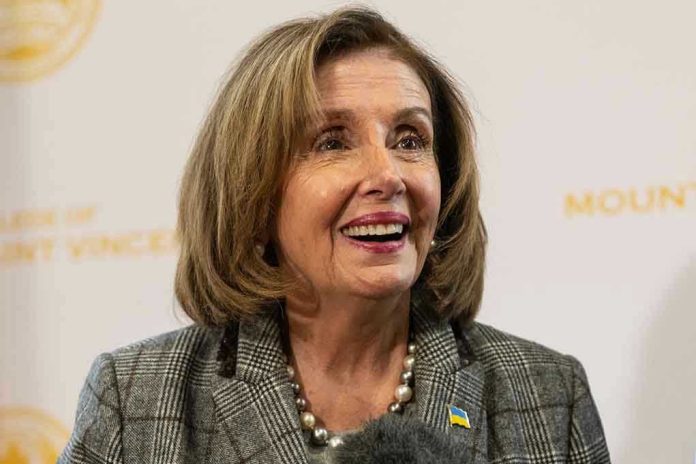
Pelosi’s staggering 16,930% stock market return as a sitting congresswoman isn’t just a headline—it’s a window into the uneasy alliance between political power and personal wealth, and you’re about to see why the numbers have Wall Street and Main Street equally transfixed.
Story Snapshot
- Nancy Pelosi’s net worth soared to $280 million after 38 years in Congress, mainly through stock investments.
- The Pelosis’ reported stock profits—over $130 million—far exceeded major market indices and peer returns.
- Her trades are so influential that investors created “Pelosi stock trackers” to follow her moves.
- Public scrutiny and ethics debates have intensified, fueling calls for congressional trading reform.
Decades of Political Power Yield Unparalleled Financial Gains
Nancy Pelosi entered Congress in 1987, reporting stock holdings valued between $610,000 and $785,000. By 2025, her net worth reached $280 million, with $133.7 million held in stocks. This growth—16,930%—dwarfs even the most bullish Wall Street projections, raising eyebrows among financial analysts and everyday Americans alike. While most lawmakers struggle to match the S&P 500, Pelosi’s family outperformed by a factor that seems to defy common sense, especially given the constraints and transparency requirements imposed on public officials.
Paul Pelosi, Nancy’s husband, has played a pivotal role as the family’s investment manager. Together, they navigated market cycles with uncanny precision, repeatedly beating benchmarks in technology and AI sectors. Their trades in companies such as Broadcom, Amazon, and Vistra consistently landed in the top five picks tracked by sophisticated platforms like Quiver Quantitative and TIKR. These platforms, designed to monitor congressional trades in real time, have put a magnifying glass on the Pelosis’ investment strategy, making their moves must-watch events for investors and market commentators.
Ethical Concerns and the Rise of the “Pelosi Stock Tracker”
Investor fascination with Pelosi’s trades sparked the creation of “Pelosi stock trackers,” digital dashboards updating the public with every new disclosure. The Pelosis’ market timing—sometimes coinciding with legislative action or regulatory shifts—has fueled speculation about potential conflicts of interest. Congressional ethics committees, tasked with oversight, find themselves under mounting pressure as watchdog groups and media outlets highlight the extraordinary returns and the opacity of certain transactions. While no direct evidence of illegal activity has surfaced, the ethical debate intensifies, echoing calls for reform from both sides of the aisle.
Public skepticism reached new heights in the wake of COVID-19, when several lawmakers faced investigations for pandemic-era trades. The Pelosis, though not implicated, saw their actions scrutinized by outlets like Fox News and the New York Post, which chronicled both the scale and speed of their portfolio growth. These stories often intersect with broader debates about whether sitting members of Congress should be allowed to trade individual stocks, and whether existing disclosure laws offer sufficient transparency to prevent abuse of insider knowledge.
Scrutiny Spurs Calls for Legislative Reform
Pelosi announced she will not seek re-election after her current term ends in 2027, but the impact of her financial disclosures remains. Lawmakers now face heightened scrutiny, and platforms like Quiver Quantitative have democratized access to congressional trading data, empowering retail investors and journalists alike. Recent legislative proposals aim to ban or restrict congressional stock trading, reflecting growing consensus that the status quo may erode public trust in government. The technology and AI sectors, buoyed by high-profile investments, now contend with reputational risks as the spotlight intensifies on political elites who profit from market moves.
Financial analysts argue that the Pelosis’ “uncanny ability to time the market” is either a testament to savvy investing or a symptom of systemic issues that blur the boundaries between legislative influence and personal gain. Ethics experts warn that without stricter regulations, Congress risks perpetuating a two-tier system—one where power translates into privileged market access, leaving ordinary investors and citizens questioning the integrity of America’s democratic institutions. As Pelosi’s career closes, the legacy of her stock market success may be measured not only in dollars but in the reforms it inspires—and the debates that refuse to fade.
Sources:
Fox News: Pelosi earned more than $130 million stock profits, return 16,930% during time in Congress
TIKR: Nancy Pelosi Stock Tracker: 2025 – 5 Top Stocks To Buy
Quiver Quantitative: Nancy Pelosi Congressional Trading Tracker







